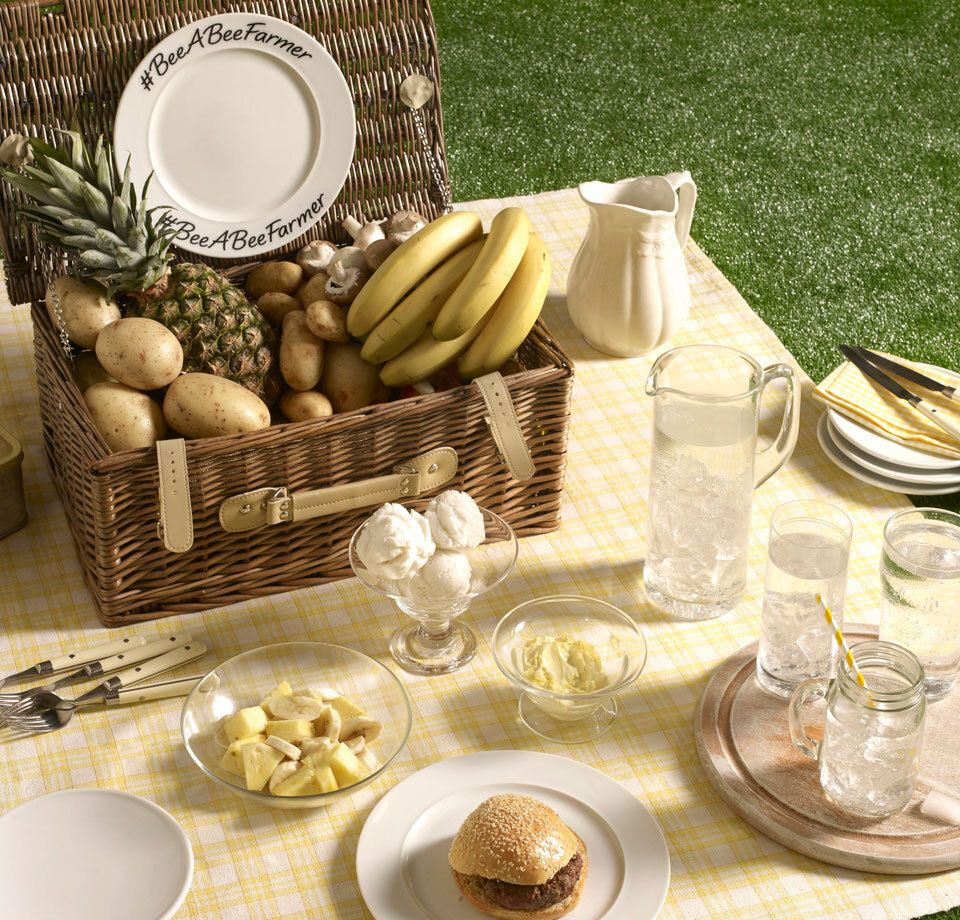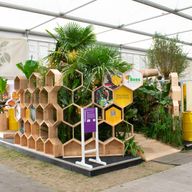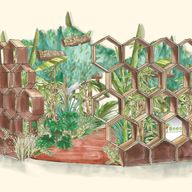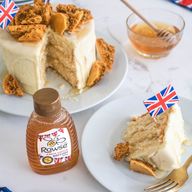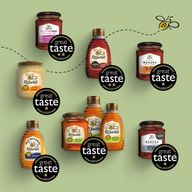
Can you imagine a summer where burgers lack lettuce, tomato, onion, relish and ketchup?
There’s no Pimms swimming with strawberries and mint at the picnic. No freshly squeezed orange juice, fruit salad or avocado available for a sunny breakfast. The top three favourite British summertime foods and drinks — ice cream sundaes, strawberries with cream, and cider — don’t exist. This is the stark reality of a world without bees that we’ve depicted in a thought-provoking visual of a pollinator-free picnic, to spotlight how this buzzing workforce needs our help.
Bees are known and loved for producing delicious honey. But did you know that our diets depend upon these powerful pollinators? They are responsible for so many of our favourite foods, bestowing a rainbow of colour, flavour, variety and nourishing goodness onto our plates — and into our picnic baskets!
A staggering three-quarters of crops that produce food for us to eat are reliant on pollinators, like bees. Well-pollinated plants produce larger, more uniform and tastier fruit and vegetables. Contrastingly, inadequate plant pollination can lead to misshapen or bland crops or, worse still, none. Even meat and dairy products benefit from bee pollination as cattle often rely on insect pollinated plants, like clover. These miniature heroes have a vital impact on food production and balancing the environment.
Without bees, our plates would be beige and bland; we’d dish up bread, mushrooms and potatoes alongside meat or fish. Our previous research found that over a third of Brits admit summer would be ruined without BBQs and picnics. Popular seasonal traditions would indeed look un-bee-lievably different, with afternoon tea off the menu too. Worse yet, there would be no ‘five-a-day’ without the hive. Here is a taste of what we’d miss out on:
- Fruit (e.g. apples, strawberries, lemons, grapes, watermelon, avocado, tomato, oranges and limes)
- Vegetables (e.g. broccoli, carrot and celery)
- Herbs
- Tea and coffee
- Honey and jam
Bees pollinate tirelessly; in turn, we enjoy balanced, delicious dishes. Take the honey bee, which typically has a foraging radius of three miles — a long way for a little guy. This incredible species is so dedicated that 12 honey bees will spend their whole lives producing one teaspoon of honey.
These hardworking heroes deserve a bee-autiful home to return to. The sting is, the number of British beehives has declined by nearly 75% over the last century. Currently, the UK is missing nearly 40% of the beehives needed to future-proof honey sustainability.
Fortunately, there’s a bee-rilliant bunch of bee farmers in the UK looking after the bees living in managed hives. They’re on the look-out for budding bee buddies with a shared passion for pollinators to grow their caring community. In fact, it’s estimated that we must increase our bee farmer count by a minimum of 33% — that’s 1,000 farmers — in the next decade so bees can continue pollinating and bringing our favourite, fresh food.
We are showing support for the buzzing workforce. We’re passionately striving to inspire, recruit and train the next generation of young British bee farmers through our world-class ‘Bee A Bee Farmer’ apprenticeship scheme, developed in partnership with the Bee Farmers Association. It’s part of our wider mission to help protect the honey bees through our Hives For Lives programme of vital initiatives, which also includes funding research into bees and offering beekeeping as a sustainable pathway out of poverty in Ethiopia. Even if you’re not considering a change of career, you can still offer bees ‘hive help’ by planting pollinator-friendly flowers like lavender and sunflowers. If you find bramble or ivy flourishing in your garden, think twice before cutting this fauna back, as they’re bee havens. Letting a little patch of grass grow longer to boost nectar count or install a bee house are also sweet ways to welcome pollinators. Buzzing visitors will soon make a bee-line!
